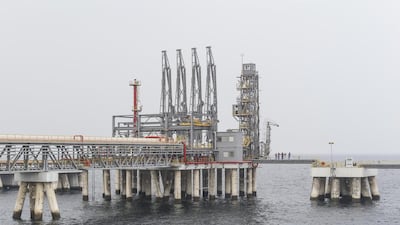Mubadala Investment Company, Abu Dhabi’s US$125 billion strategic investment firm, has put building a major new refinery at the UAE’s Indian Ocean port of Fujairah back on the agenda, more than a year after the project was shelved.
It was put on hold partly because the responsible legacy company, International Petroleum Investment Co (Ipic), was being merged with Mubadala Development Company over the past year.
The oil price slump had also put some investments by the UAE Government’s investment companies under review.
However, the new petroleum and petrochemicals platform Mubadala Investment Company, the merger of which was officially completed last month, is reviewing its strategy, especially in terms of the long-term goals and energy security requirements of the country.
“In light of the merger between Ipic and Mubadala Development Company in May, the leadership of the new company Mubadala Investment Company is currently assessing the potential Fujairah refinery project based on current market conditions,” a Mubadala executive confirmed yesterday.
The original estimate for the 200,000 barrels per day (bpd) plant in Fujairah had been put at $3.5bn, with hundreds of jobs created for the construction phase.
Two recent events have strengthened the case for a refinery at the Indian Ocean port: the refinery fire at Ruwais, in Abu Dhabi’s Western Region, which has required a resumption of petrol imports in the UAE; and the diplomatic dispute with Qatar, which has shut Fujairah – and other UAE ports – to Qatari traffic.
The Abu Dhabi National Oil Company’s (Adnoc) Ruwais refinery fire in January knocked out the residual fluid catalytic cracking unit at the plant, which will cut petrol and other light product output until next year at least.
The $10bn expansion at that plant had doubled capacity by last year, to 817,000 bpd, accounting for the processing of about 27 per cent of the UAE’s daily crude oil output. It has been a crucial element in the country’s long-term aim of meeting domestic refined products needs, as well as balancing upstream and downstream production to take advantage of markets for petroleum and petrochemicals products that are growing faster than demand for crude oil, especially in Asian markets.
Adjacent to the refinery is the Borouge petrochemicals plant, jointly owned by Austria-based Borealis, in which Mubadala has a controlling stake, which relies on the plant for feedstock.
Renewed impetus to the case for a Fujairah plant, which could meet domestic petroleum products demand, will help to serve the long-term aim of making Fujairah a petroleum trading hub for the Middle East and Asia.
Ipic originally had France’s Technip handling the front end engineering and design and its Shaw Stone subsidiary the project management side.
It had a shortlist of six South Korean engineering firms, including SK Engineering and Construction and GS Engineering and Construction, both of which had parts of the Ruwais commission, before it put the project on hold.
“I would expect Technip to still be involved,” said an engineering executive with knowledge of the process.
“As for the [engineering, procurement and construction contract] bidding, it wouldn’t surprise me if there was a fresh round, as I understand all the bid bonds were returned” from the last round.
amcauley@thenational.ae
Follow The National's Business section on Twitter

